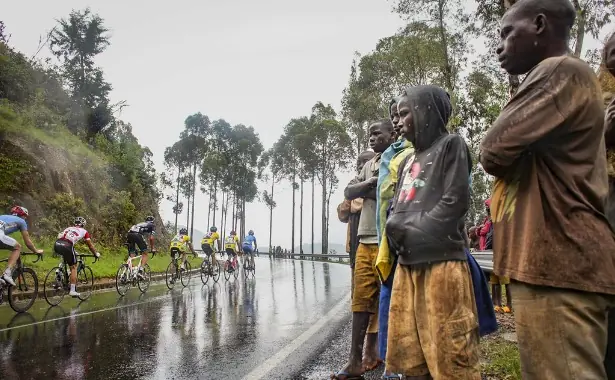
This article is courtesy of TakePart.com.
KIGALI, Rwanda— In November I flew from my home in Barcelona, Spain to Kigali to watch a little-known athletic competition, the Tour du Rwanda. A weeklong bicycle race through a mountainous landscape—Rwanda is Africa's Idaho— the Tour is a minor event on the international racing circuit. But it is important both in the emerging world of African cycling and to the image of tiny Rwanda, population just 12 million. Now in its seventh year, it has become a mainstay on the calendar of the International Cycling Union, the sport's governing body, and is among the most prestigious races on the continent.
Cycling Events Near You
Like a lot of sports events, the Tour du Rwanda is also a publicity stunt, and if I am honest, that's what attracted me to it. Rwanda's ruler of two decades, President Paul Kagame, has developed a special concern for the nation's burgeoning racing culture. His government has bought expensive high-tech bikes —Pinarello Dogmas, starting at $6,000—for the country's team and helped two Americans establish a training center, where people from other African nations come to develop their racing skills.
The Rwandan cycling team not only has become an athletic success story but now appears on the radar of the international development world,where any project achieving its goals—in this case turning young men and women, most of humble origins, into world-class athletes—becomes a matter of great interest. The Rwandan team has been the subject of an award-winning documentary film (Rising From the Ashes), a profile inThe New Yorker ("Climbers"), and at least one very good book (Land of Second Chances, by Tim Lewis).
Kagame bought their bikes, however, and at least on paper, he was a dictator. A famously slippery character, he was implicated in the mysterious deaths of his opponents, distrusted by human rights observers, and reluctant to leave office, despite being in power for more than two decades. His style of government was heavy-handed, he has acknowledged in speeches, but consider the alternative—Rwanda's past could justify a Singapore-style father figure, his firm hand suggested, and good fathers set rules.
And he gets results. More than most nations in its region, Rwanda has effectively combated corruption. Its capital, leafy Kigali, has the lowest violent crime rate on the continent. The country's environmental record is stellar, particularly on alternative energy; in November, The Guardian reported that a solar project had gone online in the country less than a year after being proposed, the sort of efficiency even the richest nations dream of. In Kigali, the streets were clean and the plumbing worked. The Internet is fast. There are no urban slums. The air, which in many nations with similar economic profiles would stink from open sewers, in Rwanda smells of the tea harvest.
The world's political and business leaders adore Kagame. In April, six months before the race, he attended the four-day Milken Institute Global Conference in Los Angeles, a kind of Pacific Davos conference, where he hobnobbed with Tony Blair and Patricia Arquette, and led "a session on actions needed to make the world better for women and girls as well as a panel discussion on exploring the future of Africa," reported the government's house organ, The New Times. The words "Rwanda's miracle" appeared in the world's press countless times over Kagame's first decade in office. Bill Clinton called him among "the greatest leaders of our time," and U.N. Secretary-General Ban Ki-moon hoped "many African nations would emulate what Rwanda is doing," reported Politico.
Kagame, who has led Rwanda since shortly after the end of the 1994 genocide, was not coy about the bicycle race's significance to his country's international imagine. On several occasions, he has noted the value of Rwanda's cyclists as ambassadors and the running of the annual race as a way of helping move the country's identity past its overwhelming association with the genocide of 20 years ago. Several of the riders survived it as children. Now strong, even miraculous athletes, they raced up Rwanda's imposing, forested mountains at 20 and 30 miles per hour as barefoot children ran alongside them, laughing and cheering. Field hands paused from the coffee harvest to applaud the heroes of a united Rwanda. The soaring forests that had been the redoubts of killers were now the proving grounds of their victims' orphaned children, whose daily rituals on those pitiless slopes had made them more powerful than the genocidaires could ever imagine. Reading up on the race, a description of the most mundane 10-mile training jaunt seemed like a scene from Chariots of Fire.
The narrative is hard to question, and I wasn't flying to Kigali primarily to question it. But it did seem suspiciously like a storybook. The depth of Kagame's task provokes a certain sympathy. The killing of at least 800,000 people in barely 100 days has defined the country for so long, and the country's abandonment by the world in its hour of need was so absolute, one struggles to imagine the path forward for such a nation.
The slogan "Never Again" appears all over Rwandan human rights literature and the website of Kigali's Genocide Museum. The phrase, coined in the '60s, was first associated with the Nazi Holocaust, and indeed, for how long after World War II had Germany been primarily defined by its past?
An event like the bike race, an innocuous, nonsensical enterprise—riding a bicycle over a mountain is a fundamentally pointless thing to do, and my favorite pastime is riding bicycles over mountains—seemed an ideal way to signal Kagame's more concrete achievements, without inviting scrutiny of his political methods.
So I asked myself, and my editor: Were it not 2015 but 1965, and were I flying not to Kigali but to Berlin to write about an obscure bike race there, would we feel compelled to mention Buchenwald? Dwell on it, even? It seems it would be unfair, or at least counterproductive.
Then I got on the plane.
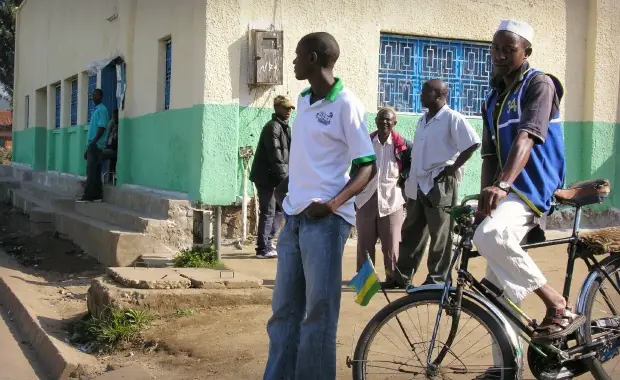
Bicycle racing is a team sport. A ride over precipitous hills at high speed for hours at a time is too demanding for a single racer to win by just pedaling flat-out. Instead, a weaker teammate will help another by riding in front to block the wind, so the favorite conserves energy as she rides in the slipstream. Or a sudden sprint by a lesser-known rider can deceive rivals into chasing, tiring them out, while a teammate tucked back in the pack remains fresher and is ready to burst ahead close to the finish line.
Such tactics would be conspicuously necessary at the Tour du Rwanda. Other than the runway at Kigali International Airport, Rwanda appears not to have a single square foot of flat land within its borders. Most of the country rises to about a mile high, virtually all of it rolling hills broken by large, occasionally enormous mountains. The race would be a week of climbing up, over, and down one mountain and then up, over, and down the next, all day for seven days, the 69 young men treated like dromedaries—race organizers had plotted a route for maximum drama, which usually means pain. The cyclists who didn't train at altitude properly would soon drop out. After two days there were 65. Then 61. Then 54. By day six, there were 47.
On day two, as the racers streamed out of the capital and began a 1,300-foot climb, heading past deeply green coffee plantations, I was informed my press credentials had been denied, for reasons no one seemed able to explain. Earlier in the day, the French fellow who runs the Tour had waved a paper at me I'd sent him and screamed that I hadn't sent him the paper. He seemed stressed. With a photographer, I got in the international press car anyway, because there was no international press to speak of; the car was empty. We rode with the publicist for the Rwandan bike team two hours to the border with the Democratic Republic of the Congo. The car stayed a few minutes ahead of the race the whole time, never seeing an actual racer from closer than a mile away. Arriving at the finish line, the publicist told the photographer with me to go stand near it, so he did. The stressed-out French guy saw that, tackled the photographer, and kicked us out.
The next day we hired a local guy name Fabian to drive us around instead. He spent the whole time telling us that everyone hated Paul Kagame and was terrified; that the streets of Kigali were spotless because the ticket for littering was the equivalent of three months' salary (Kigali police refused to confirm that), and the ticket for speeding about the same (ditto); and that anyone who criticizes Kagame and the mentally ill were kept locked up in an unnamed prison four miles from the U.S. Embassy. Fabian was an angry guy.
A classic cheap reporter's tactic while researching dictatorships on short trips is to quote one's taxi driver as if he or she were the oracle of Delphi, and it is not really a reliable route to truth. But Fabian was correct, it turned out. Excessive punishments in Rwanda had caught the eye of Human Rights Watch, which polices judicial issues, among other things, and found Rwanda's celebrated clean streets had a terrible explanation. "This positive image of a sparkling and safe city is largely a result of a deliberate practice by the Rwanda National Police of rounding up 'undesirable' people and arbitrarily detaining them at Gikondo Transit Center, an unofficial detention center in the Gikondo residential suburb of Kigali," the group wrote in a September report. "There, they are exposed to human rights abuses, including inhuman and degrading treatment, before being released back onto the streets, often with orders to leave the capital."
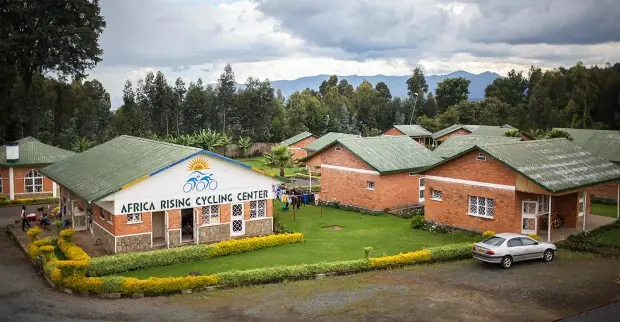
In 2014, after a U.S.-coached Rwandan team did well in the race, Kagame invited the team's founder, Jock Boyer, a former professional cyclist, to speak at a state event. "People said, if you're going to address the president, you better ask him for something," said Kimberly Coats, who manages the team, now called Team Africa Rising. "So we asked for bicycles and to be given this place, the training center." Kagame agreed, and it has been money well spent. It wasn't the president's only donation. The winner of the second stage was presented with a bonus check. "A private gift from President Paul Kagame," the race announcer had said over the loudspeaker. Not public funds, not tax money, he labored to point out. A personal gift from the president, a fan.
The bikes, and the team, were part of the public budget, and one of the gleaming new Pinarello cycles was carrying Coats' best hope that year, a Rwandan with quicksilver legs named Jean Bosco Nsengimana, now 22. "Bosco," as he preferred, was atop the race's overall leaderboard after the day two, and his prospects for the rest of the week looked good, if he could hold his form. Team Africa Rising was dominating the race, and Bosco had come in well ahead of his closest rivals that day with an impressive pace over nearly three hours of grueling climbs. Stage 2 had carried the field from Kigali to a finish line near Virunga National Park, home to Rwanda's famous mountain gorillas.
Coats is hoping to make the rural valley near the Congo border as famous for bicycle racing as it is for nature, and she invited me to visit the training center, which was near that day's finish line.
"I call this little America," said Coats, standing inside the compound of brick cottages an hour from Kigali. "I don't—honestly—I don't need to go outside much." She and Boyer have recently expanded the project to Eritrea, another country where it pays to be more interested in bicycles than politics, where the roads are great and questions are hard to answer. "Give me ten million dollars, and I'll have an all-African team tomorrow," she claims. But she also said that she and Boyer, who was behind her futzing with one of the race officials' motorcycles, are thinking of heading home.
The training center was buzzing, busy after the race, which the team also helps administer. Boyer, who had been the first American to race in the Tour de France back in the 1980s, is also a motorcycle enthusiast; he loans his small fleet of bikes to the race to carry press photographers and sometimes course judges, of whom he is one (he's also a convicted felon, having served time for sexual abuse of a minor, a widely reported, unsavory story). Behind Coats, across a patch of lawn, a crew of mechanics was hosing the day's grit off the team's pricey bicycles. "I just want my guys to do well," she said. She didn't think about politics if she could avoid it, which she usually could, she said.
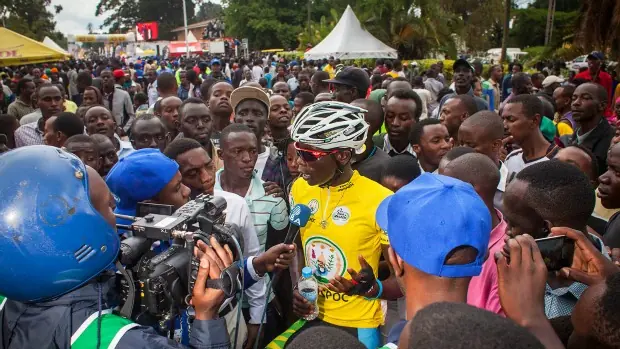
Two versions of the 1994–2015 Rwanda story exist, and both are important. The official narrative, told in Rwandan schoolbooks, in museums, and by any government official one might ask, describes a small, landlocked nation cruelly divided by a rapacious colonial occupier. In Rwanda's case this was the Belgians, but it's a bit facile to pin genocide on the legacy of one royal family; it was the 19th century, and Europe's relationship to Africa was that of mercantilist abuse. Resentments the Belgians leveraged to keep the locals divided, and thus weaker, built up between groups of Rwandans. (The policy was the same in Burundi.)
Decades later those old colonial divisions exploded into genocide. A U.N. peacekeeping force asked for reinforcements and permission to intervene but got neither from U.N. leaders in New York. From there, the country was on its own. Warnings were ignored: Susan Rice, now President Obama's national security advisor and the then director for international organizations and peacekeeping for the National Security Council, reportedly dragged her feet on the matter, and in White House memos from 1994 declassified this year and reported in Foreign Policy in April, her boss, Richard Clarke, proposed orchestrating a pullout of U.N. peacekeepers from Rwanda even as the genocide was gaining steam. Twenty years later, Rice still gets the occasional finger-pointing for not running warnings of genocide up the ladder to Secretary of State Madeleine Albright and President Bill Clinton. Clinton has been apologizing ever since; Rice's career has survived the criticism of her 1994 role as well as her stances on more recent violence in the region.
Three months of massacres ensued in a country isolated by geography and altitude, a place of high mountains and thick forests, Eden in any other circumstance—and a fantastic place for a bike race—but a lush trap for the civilians trying to escape the hell of April to July of 1994. The only relatively safe zones would be near the Ugandan and Congolese borders, from where a rebel army led by Paul Kagame would push south and attack the machete-wielding militias, conquering Kigali and ending the genocide. Kagame would soon serve as vice president and minister of defence in a transitional government before becoming president in 2000.
Over the next 20 years, led by Kagame's firm hand, Rwanda would rebuild a shattered, traumatized nation with pioneering reconciliation processes. The country where cholera had once threatened would become orderly to a fault. Once a month, the entire citizenry would turn out for a three-hour community cleaning period, where neighbors picked up litter and scrubbed bus stop benches. Incomes would double (though more in the cities than in the country, where poverty remains acute). Hollywood, in films like Hotel Rwanda, would carry forward a Great Man vision of events, in which individual heroism, a passel of Rwandan Oscar Schindlers, would face evil and evil would blink; this, for the most part, remains the global narrative.
The other version of the Rwanda story follows roughly the same events but adds one codicil. In 2010, a United Nations report called—and this is really the title—Report of the Mapping Exercise documenting the most serious violations of human rights and international humanitarian law committed within the territory of the Democratic Republic of the Congo Between March 1993 and June 2003, leaked to the international press. It accused forces Rwandan forces of leading a campaign of reprisal killings and ethnically based attacks for years following the genocide, many just across the Rwandan border in the DRC. The research, summarized at the time by the American Association of International Law, "points to the perpetration of war crimes, crimes against humanity, and possible genocide within parts of the DRC at different periods. It documents atrocities, chronologically and by region, that were committed against a background—and sometimes in furtherance—of several conflated local, regional, and international conflicts."
It described, in remarkably specific terms, genocide similar to what had been perpetrated against Kagame's people: "Massacres were?designed to kill as many victims as possible. Every time they spotted a large group of refugees, the [Kagame-led] soldiers fired indiscriminately at them with heavy and light weapons. They would then promise to help the survivors return to Rwanda. After herding them up under a variety of pretexts, they most often killed them with hammers or hoes. Those who tried to escape were shot dead." It went on to describe the decapitation of children.
Kagame denounced the report. "The whole idea of a genocide in the Congo is flawed," he told the BBC at the time.
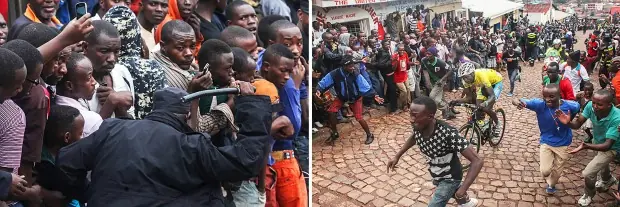
The penultimate stage of the Tour du Rwanda would end on a vertiginous, mile-long hill in a residential district of Kigali. The street in question turned out to be a cobblestone avenue so preposterously steep, I briefly thought I was in the wrong place. But an hour before the riders were expected to arrive, people from the neighborhood started lining up along both sides of the road, and a cop stationed at the top of the hill told me in halting French that the race was coming thataway. I settled in.
It was Nov. 21, the rainy season, when Rwanda's equatorial skies open up every day at about two in the afternoon. Just as the race's trusty Twitter feed reported the 47 bike racers had reached the edge of town, the rain came, and the hundreds of fans all threw themselves back from the sidewalk and fought for space under tin awnings of small businesses along the road.
We waited and watched the rain flood the street. I'd been at the race for a week by then, and my basic impression was that it was too cruel by half, even as bicycle racing goes, and bicycle racing is a sport for masochists.
To complicate matters, the street where that day's last hill rose was one of the few roadways left in Rwanda not covered in asphalt. It was an uneven surface of muddy cobblestones, and in the tropical downpour, the slope was so severe the water rushed downhill as tiny rapids. The racers, said the Tour du Rwanda's Twitter feed, were 20 minutes away still, battling through the storm.
Crammed under the awning, a man who said his name was Martin asked about my camera, an obtrusive monstrosity hung over my shoulder that screamed, to any half-critical mind, International media. I am silently judging you. Martin possessed such a mind and so kept asking nosy questions—who did I work for, could the camera shoot video, what was I doing in Rwanda, what newspaper employed me.
Martin was my third or fourth spy, to that point. The rumors one hears before visiting Rwanda, which never seemed more than rumors, had warned of amateur neighborhood informants who looked for low-level information, which they'd sell to the police for pocket money. Martin seemed the type but was so clumsy about it I couldn't believe he was serious. "You're a reporter," he whispered through the rain. "Tell me what you wish to write about Rwanda. I will tell you what to write and help you with your work as a journalist." I am convinced he was partially trolling me, and enjoying the parley, and seemed unhappy when the rain finally tapered, as I excused myself from the awning and backed away.
Across the road, a commotion erupted where the crowd was thickest. A man yelled that another had tried to pick his pocket. Two policemen watching from the top of the hill rushed down and tackled a man and forced him onto his stomach in the middle of the road. A third cop ran up with a baton drawn and started beating the man on the back of his legs. The shouting grew. A few young men and a middle-aged woman from the crowd jumped into the road to participate in the beating, yelling in Kinyarwanda, Rwanda's lingua franca, and kicking at him. The police let them continue for a time before cuffing the alleged thief and frog-marching him to a wall a short distance away, where he sat glumly bleeding from his mouth, soon slinking out of view.
The racers were getting closer then, and the police returned from beating the alleged thief to push the crowd out of the way of the approaching bicycles. Rather than tell people to back up, the officers swung their truncheons, first probingly, then wantonly, into the mass of a few hundred people, whipping their nightsticks back and forth as if cutting weeds. When that didn't work they moved to overhead swings, which had muscle behind them and did work. Every few seconds someone would get whacked very badly. Everyone was packed in tightly, and some luck was involved. Across the road, a nightstick crunched into the back of a boy's knee; he looked about 14. On our side, another swung into the back of its target's head; the man went down for a moment, until two friends dragged him inside a shop.
At this point it is worth repeating that this was not a political rally, a protest, or a riot. This was a bicycle race.
The crowd responded to the blows with patience. Small shifts of position, reducing one's exposed surface area, and bringing the head below the level of any nearby shoulder, seemed favored over simply ducking out of the scene and running away, perhaps for fear of missing the race. More cops came from up the road and started swinging near me. The few hundred spectators, mostly but not exclusively young men, seemed unfazed by the batons, and experienced at avoiding them. If you leaned only a few inches right or left as the baton went up, you could coax the officer to juuuuuust miss, the way a boxer slips a punch.
They didn't hit white people, of which I saw four. I'm white and I was one of the four; rather, the police officer I'd spoken to earlier seemed to decide I and another person not from the neighborhood needed a better view, and whipped around and smacked a guy standing in front of me in the knee. The young man collapsed against me for a moment, then stood back up and said not to worry about it. He said he was bruised but fine. The appropriate response in such situations, I believe, is to recognize a person's agency but also to step back, as it seemed I was now the cause of an assault. The melee continued for several minutes, the batons swinging, the spectators bobbing and weaving, then returning to reclaim their vantage points on the curb.
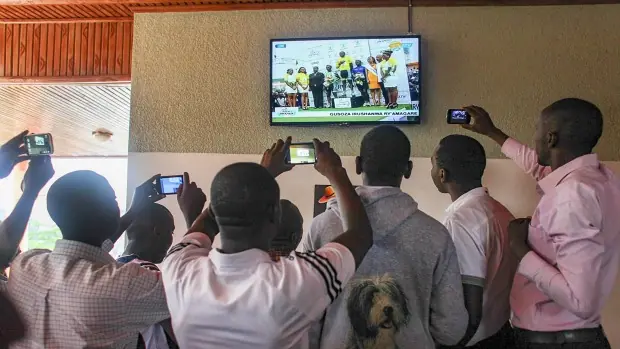
After about 10 minutes of beatings a roar came as the first racer was spotted climbing through the last drops of rain. Distracted, the police paused their attack to see if the favorite, Bosco, was near the leaders. The riders arrived, and people ran with them up the hill, shouting encouragement. The police put their batons away.
People get clubbed all the time, all over the world. A few weeks after the bike race, French police brought out the clubs against protesters at the Paris climate talks. In the U.S., abuse with clubs has become an afterthought in some cases, because police overreach also involves guns. It wasn't such a terrible day. But for the life of me I can't remember who won that stage of the race, and we were a mile from the finish line. It's not in my notebook, which contains only the details of the confrontation described above.
The hill where the racers struggled through the crowd was less than a mile from the city's affecting Genocide Museum, and a baton flies along the same arc a machete might. Kagame's task, of making the rest of the world look forward, is complicated by the tendency of people like me to encounter a baton and think of a machete, to stumble into the scene of excessive violence by police and a moment of mob justice from a crowd and think of genocide instead of excess. Slippery slopes and so forth. The people at the race, though, did not leave. They waited, and when the Rwandan champion Bosco had passed, straining heroically on the steep, slick hill, they had cheered with naked patriotism. Who am I, a bicycling fan on a two-week visit, to say?
I went sneaking home with pictures of the cops hitting people with batons saved in a folder on my laptop labeled as my young son's birthday pictures. Rumors of airport customs officers seizing digital files were common, if unproved. A tea exporter staying in the same place I was renting had looked at the pictures over my shoulder and suggested I hide them. A friend of hers, doing research of a sensitive nature, had a hard drive taken off her by airport customs while leaving the country a few weeks before, she said. She had no idea how they'd known what was on the drive.
On the last day, it rained again as it had all week, reliably at two. Bosco won. Across Kigali, a shout went up as the news broke (everyone had a notification set on their phone).
It was the expected result.
"The Rwandans, they've got 15 riders, they can control the race," said two of the losers, one Eritrean and the other Swiss, in identical words four days apart. (Neither wanted to be identified; both finished in the race's top 10). "It's the biggest event of the year in Rwanda, so you have to put everyone in," said Usher Komugisha, a local sports journalist who also serves as Team Africa Rising's spokesperson. "And, sure, they train on these roads—they're home." Teams from Egypt, Morocco, Kenya, France, Switzerland, South Africa, and the U.S. had five members each, and the Rwandans had cooperated to control the pace. Even just having a friendly rider alongside to mark a pace while pedaling up a long hill can mean the difference between winning the race and just finishing it. A tenth of a mile per hour more speed out of your burning legs means you're 500 yards ahead of your rival in a few minutes and 1,000 yards after another mile. By the finish line you're 10 miles ahead—if you can keep it up. For a week, Bosco, the star of Team Africa Rising and Rwanda's favorite son, benefited from such tactics.
The victory ceremony happened under umbrellas. Bosco, in the winner's yellow jersey, stood on the winner's stage and beamed. "Thank you President Kagame," read signs beside the podium. Out of the rain, people were taking phone-cam pictures of bar TVs showing the Rwandan champion accepting his medal.
A few weeks later, news would break that Bosco had been signed by a French team. Team Rwanda had pulled off another miracle, another tearjerker, a sequel to Chariots of Fire. It's the best story ever.
A few weeks later, Rwanda's parliament, which is dominated by Kagame's political party, announced that a referendum would be held just a month later, asking Rwandans to approve a change in their Constitution to allow Kagame, whose second and final term as Rwanda's president is up in 2017, to stand for a third seven-year term, and then for two five-year terms after that.
On Dec. 18, 98.4 percent of votes cast were in favor of the change. Kagame is now eligible to remain president of Rwanda until 2034.
Related Articles:
Marc Herman is the author of The Wizard and the Volcano, The Shores of Tripoli, and Searching for El Dorado and a cofounder of Deca, a longform journalists' co-op. He lives in Barcelona.
 Ready to Ride? Search for a cycling event.
Ready to Ride? Search for a cycling event.


